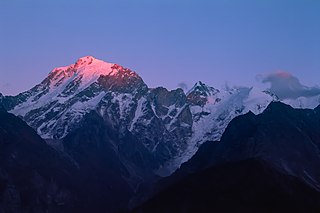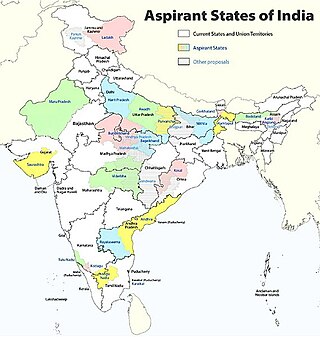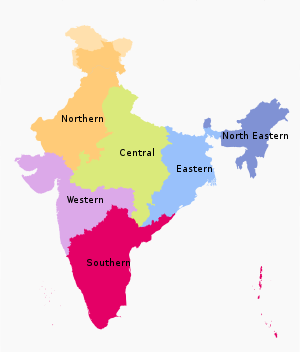
India is a federal union comprising 28 states and 8 union territories, with a total of 36 entities. The states and union territories are further subdivided into districts and smaller administrative divisions.

Bombay State was a large Indian state created at the time of India's Independence, with other regions being added to it in the succeeding years. Bombay Presidency was merged with the princely states of Baroda, Western India and Gujarat and the Deccan States.

North India is a loosely defined region consisting of the northern part of India. The dominant geographical features of North India are the Indo-Gangetic Plain and the Himalayas, which demarcate the region from the Tibetan Plateau and Central Asia.

Mysore State, colloquially Old Mysore, was a state within the Dominion of India and the later Republic of India from 1947 until 1956. The state was formed by renaming the Kingdom of Mysore, and Bangalore replaced Mysore as the state's capital. When Parliament passed the States Reorganisation Act in 1956, Mysore State was considerably enlarged when it became a linguistically homogeneous Kannada-speaking state within the Republic of India by incorporating territories from Andhra State, Bombay State, Coorg State, Hyderabad State, and Madras State, as well as other petty fiefdoms. It was subsequently renamed Karnataka in 1973.
The High Courts of India are the highest courts of appellate jurisdiction in each state and union territory of India. However, a high court exercises its original civil and criminal jurisdiction only if the subordinate courts are not authorized by law to try such matters for lack of pecuniary, territorial jurisdiction. High courts may also enjoy original jurisdiction in certain matters, if so designated specially by the constitution, a state or union law.
In England, an unparished area is an area that is not covered by a civil parish. Most urbanised districts of England are either entirely or partly unparished. Many towns and some cities in otherwise rural districts are also unparished areas and therefore no longer have a town council or city council, and are instead directly managed by a higher local authority such as a district or county council.
The administrative divisions of India are subnational administrative units of India; they are composed of a nested hierarchy of administrative divisions.

This is a list of proposed states and union territories in India. The constitutional power to create new states and union territories in India is solely reserved with the Parliament of India. The parliament can do so by announcing new states/union territories, separating territory from an existing state or merging two or more states/union territories or parts of them. In addition to the existing 28 states and 8 union territories, several new states and union territories have been proposed throughout India's history.
The States Reorganisation Commission (SRC) constituted by the Central Government of India in December 1953 to recommend the reorganization of state boundaries. In September 1955, after two years of study, the Commission, comprising Justice Fazal Ali, K. M. Panikkar and H. N. Kunzru, submitted its report. The commission's recommendations were accepted with some modifications and implemented in the States Reorganisation Act in November, 1956. The act provided that India's state boundaries should be reorganised to form 14 states and 6 centrally administered territories.

The Tamil Nadu Legislative Assembly is the unicameral legislature of the Indian state of Tamil Nadu. It has a strength of 234 members of whom are democratically elected using the First-past-the-post system. The presiding officer of the Assembly is the Speaker. The term of the Assembly is five years unless dissolved earlier.

A union territory is a type of administrative division in the Republic of India. Unlike the states of India, which have their own governments, union territories are federal territories governed, in part or in whole, by the Union Government of India. There are currently eight union territories in India, namely Andaman and Nicobar Islands, Chandigarh, Dadra and Nagar Haveli and Daman and Diu, Delhi, Jammu and Kashmir, Ladakh, Lakshadweep and Puducherry.

The States Reorganisation act, 1956 was a major reform of the boundaries of India's states and territories, organising them along linguistic lines.

Northern Zonal Council is a zonal council that comprises the states and union territories of Chandigarh, National Capital Territory of Delhi, Haryana, Himachal Pradesh, Jammu and Kashmir, Punjab, Rajasthan and Ladakh.

Central Zonal Council is a zonal council that comprises the states of Chhattisgarh, Madhya Pradesh, Uttar Pradesh, and Uttarakhand.

Eastern Zonal Council is a zonal council that comprises the states of Bihar, Jharkhand, Odisha, and West Bengal.

Southern Zonal Council is a zonal council that comprises the states and union territories of Andhra Pradesh, Karnataka, Kerala, Puducherry, Tamil Nadu, and Telangana

Zonal Councils are advisory councils and are made up of the states of India that have been grouped into five zones to foster cooperation among them. These were set up vide Part-III of the States Reorganisation Act, 1956.









